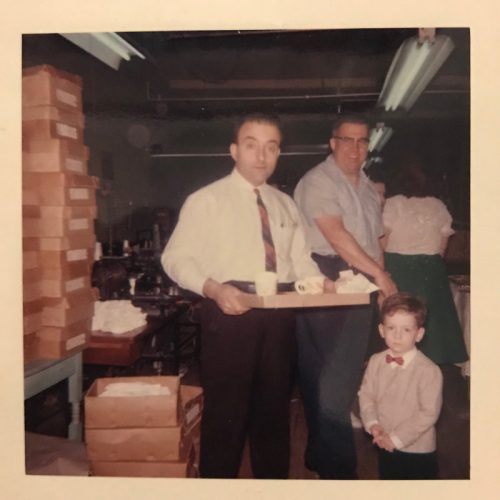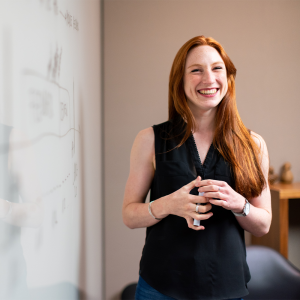Plan B – Always Have One, Try Not to Need One
by Neil Rosenbaum
I think I was about six when I remember first going to work with my father. I remember clearly walking, probably with WAY too much energy, around his old-fashioned partner desk. His business partner in this glove manufacturing business was there on the other side of the desk. I’m sure he was very distracted and irritated by me. I have many similar memories from those very young years. Often, my dad would take me on a Saturday morning when he would work for a half day. (My favorite part was sitting at a lunch counter on the way home.)
It was a time when kids were allowed to wander. I’d amble around the factory, taking things apart, breaking things, and “exploring” endlessly. I loved it. (Note: Don’t stick your finger in holes in sewing table tops. I did that once and found that there were sewing needles that had fallen inside, point up.)
Over the years, I started to really work at the factory, instead of just getting in the way. Weekends, school vacations, and any time that I could get free. I refused to go to summer camp so I could work all summer.
The longtime workers became my friends, my heroes, and my role models. (Most importantly, my dad, although I didn’t realize that until many years later.)
I went to college thinking that I would join my dad’s business when I graduated. As a result, and because I was undisciplined, I did not apply myself during the next four years. I was going to be a “glove man” and was all set. I did have a great time, made lifelong friends, learned to get things done with short timelines, and to get along with many different types of people.
When I came home for the Christmas holiday break of my senior year, sitting at the dining room table for the consistent 6:00 dinner we observed as a family, my father announced that he would be selling the business. I immediately got up, in a cold sweat, went to the bathroom down the hall, locked the door… and almost… threw up.
I got myself together, put on an appropriate face, and returned to the dinner table. We had more discussions about who was buying the business and what my dad would do following the sale.
As with so many things in our life to that date, my father projected confidence, control, and optimism.
So, in one of the worst labor markets in memory, I proceeded to start a job search. I went to many interviews. However, due to my lackluster grades and resume, I was greeted by many interviewers with, “So…do you have any questions?” Clearly a plea to get out of the interview room and give them time for a bathroom or coffee break.
To make a long story short, it all worked out. I ended up with a terrific job in a Xerox Corporation training program. There, on the first day, I met the woman who would be kind enough to marry me and, together, we have four wonderful kids.
How did the B- student end up in one of the most highly regarded sales training programs? In an act of desperation, I answered an ad for an insurance salesman for Northwestern Life. I took the assessment they gave me and must have done well. After the test, the General Partner came in the room and asked me to come to his office. During that session, he told me EVERYTHING about being a successful, professional salesperson.
Two weeks later, I landed an interview with the local Xerox office. I had EVERY answer the interviewer asked. I must have seemed like a twenty-year-old sales savant. All I had to do was spit back the answers given to me by the insurance agent, one at a time.
I got the job and started on a “Plan B” life.
I tell this story because, from it, I have four important lessons that I believe have served me well.
[ONE]
All learning is valuable – We all heard as children that “you should learn math because, trust me, you will use it later in your life.” The reality is that you absolutely never know when some piece of learning or experience, no matter how obscure, can become invaluable when you least expect. If I hadn’t taken that insurance interview, there was no way I would have landed at Xerox. In his book, What Got You Here Won’t Get You There, Marshall Goldsmith reports that what separates the most successful leaders is the drive to never stop asking questions and taking responsibility to continually learn and grow.
[TWO]
Always apply and push yourself – It’s obvious to me now that hard work pays off… big. While having a “Plan B” is a good practice, it’s better to not need it. Warren Buffet advises that a great way to accomplish this is to “choose to be around people better than you.” Those people will push you, teach you, and inspire you.
In her book, Imagine It Forward, Beth Comstock says that “she owes her success to learning to exist with ambitions that can sometimes leave her uncomfortable and living with uncertainty.” Learning curves are always steeper when we are outside our comfort zones. New Yale research published in the journal Neuron has found that “uncertainty signals the brain to kickstart learning.” Keep pushing forward!
[THREE]
Always be flexible – One of the greatest leaders I had the good fortune to work for used tell us constantly that it is more important to plan for flexibility than to spend immense amounts of time trying to devise the perfect plan. When it’s time to adapt your plan or move to Plan B… act!
[FOUR]
Always, always have a positive, passionate attitude – A lesson I learned from my father. As a leader in your business, your community, or your family, the attitude you project affects everyone around you. Every challenge has a solution.







